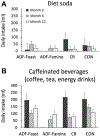Beverage intake during alternate-day fasting: Relationship to energy intake and body weight
- PMID: 30983506
- PMCID: PMC7183821
- DOI: 10.1177/0260106019841452
Beverage intake during alternate-day fasting: Relationship to energy intake and body weight
Abstract
Background: Alternate-day fasting (ADF) involves a 'famine day' (25% energy intake) and a 'feast day' (ad libitum intake). This secondary analysis examined changes in beverage intake in relation to energy intake and body weight during 12 months of ADF versus daily calorie restriction (CR).
Methods: Obese subjects (n = 100 enrolled, n = 69 completers) were randomized to one of three groups for 12 months: (a) ADF; (b) CR; or (c) control.
Results: At baseline, intakes of diet soda, caffeinated beverages, sugar-sweetened soda, alcohol, juice, and milk were similar between groups. There were no statistically significant changes in the intake of these beverages by month 6 or 12 between ADF (feast or famine day), CR, or control groups. Beverage intake was not related to energy intake or body weight at month 6 or 12 in any group.
Conclusion: These pilot findings suggest that intermittent fasting does not impact beverage intake in a way that affects energy intake or body weight.
Keywords: Beverage intake; alcohol; alternate-day fasting; body weight; caffeine; calorie restriction; obese adults; soda.
Conflict of interest statement
Declaration of conflicting interests
The author(s) declared the following potential conflicts of interest with respect to the research, authorship, and/or publication of this article: Krista Varady is the author of the book ‘The Every Other Day Diet’ published by the Hachette Book Group. The other authors have no competing interests to disclose.
Figures


References
-
- Brice CF and Smith AP. (2002) Effects of caffeine on mood and performance: a study of realistic consumption. Psychopharmacology (Berl) 164: 188–192. - PubMed
-
- Gavrieli A, Karfopoulou E, Kardatou E, et al. (2013) Effect of different amounts of coffee on dietary intake and appetite of normal-weight and overweight/obese individuals. Obesity (Silver Spring) 21: 1127–1132. - PubMed
Publication types
MeSH terms
Grants and funding
LinkOut - more resources
Full Text Sources
Medical
Research Materials

